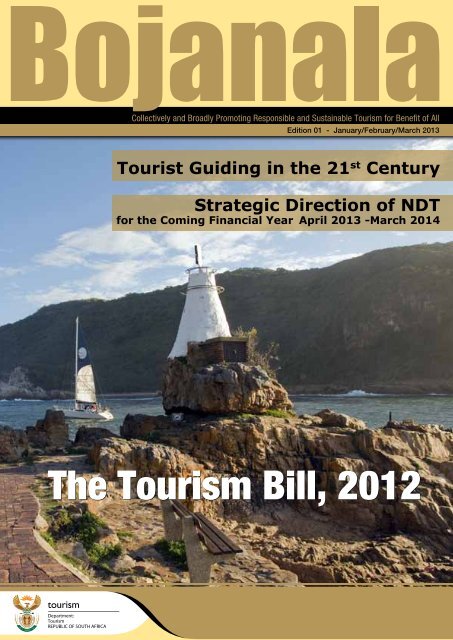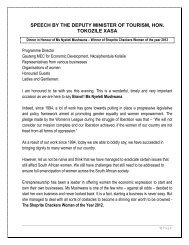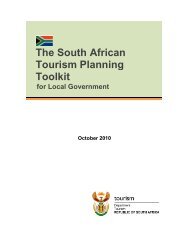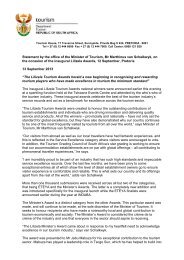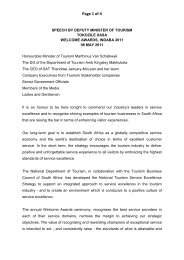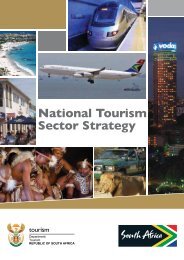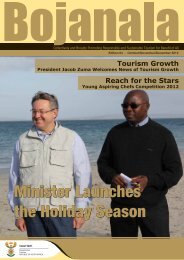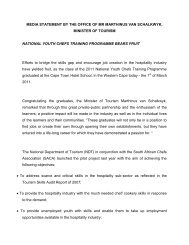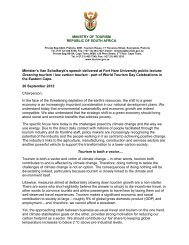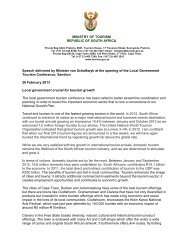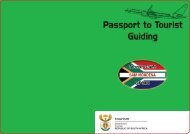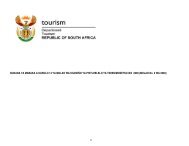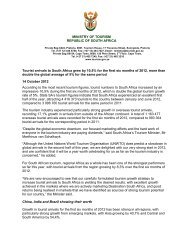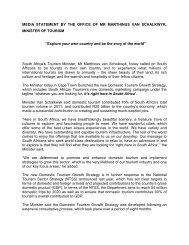Bojanala January - March 2013 - Department of Tourism
Bojanala January - March 2013 - Department of Tourism
Bojanala January - March 2013 - Department of Tourism
- No tags were found...
Create successful ePaper yourself
Turn your PDF publications into a flip-book with our unique Google optimized e-Paper software.
Collectively and Broadly Promoting Responsible and Sustainable <strong>Tourism</strong> for Benefit <strong>of</strong> AllEdition 01 - <strong>January</strong>/February/<strong>March</strong> <strong>2013</strong>Tourist Guiding in the 21 st CenturyStrategic Direction <strong>of</strong> NDTfor the Coming Financial Year April <strong>2013</strong> -<strong>March</strong> 2014The <strong>Tourism</strong> Bill, 2012
<strong>Bojanala</strong> TOURISM Edition 01 <strong>January</strong>/February/<strong>March</strong> <strong>2013</strong>2Market Access for Mashovhela Lodge4 Tourist Guiding in the 21 st Century8Strategic Direction <strong>of</strong> NDT for the Coming FinancialYear April <strong>2013</strong> -<strong>March</strong> 201411 The <strong>Tourism</strong> Bill, 201215NDT Successfully Hosts the Local Government<strong>Tourism</strong> ConferenceBack Upcoming <strong>Tourism</strong> EventsAbout the CoverCollectively and Broadly Promoting Responsible and Sustainable <strong>Tourism</strong> for Benefit <strong>of</strong> AllEdition 01 - <strong>January</strong>/February/<strong>March</strong> <strong>2013</strong>Tourist Guiding in the 21 st CenturyStrategic Direction <strong>of</strong> NDTfor the Coming Financial Year April <strong>2013</strong> -<strong>March</strong> 2014The <strong>Tourism</strong> Bill, 2012The cover shows the beautifulcoastline in Knysna in theGarden Route <strong>of</strong> the WesternCape Province. Also appearingon the image are the marvellousrock formations along thecoast. Image courtesy <strong>of</strong> SouthAfrican <strong>Tourism</strong>.Editor in ChiefJay SinghContributorsVicky MaakeMmapula MakgamathaMmaditonki SetwabaHannelie du ToitUveshnee PillayResearchers/WritersCharles MakuwerereMasingita MakamuLekau HlabolwaVictor SiphuguLayout/ProductionBembani Group (Pty) LtdPage ii
TOURISM Edition 01 <strong>January</strong>/February/<strong>March</strong> <strong>2013</strong><strong>Bojanala</strong><strong>2013</strong> Greetings to Our <strong>Bojanala</strong> Readers!The year <strong>2013</strong> is already in full swing, and the first quarter <strong>of</strong> the year has been extremely busy, with the <strong>Department</strong> gettingtogether on a Lekgotla on the 22 nd and 23 rd February. During this session the <strong>Department</strong> interrogated its targets for the <strong>2013</strong>-2014performance year and carefully revisited its strategic direction in the coming performance cycle which was tabled for discussionbefore the <strong>Tourism</strong> Portfolio Committee in Parliament on Wednesday, 13 <strong>March</strong> <strong>2013</strong>. The Lekgotla reinforced the <strong>Department</strong>’sresponsibility to create the much needed jobs for South Africa, and to that end areas <strong>of</strong> focus for job creation were identified. TheLekgotla has set a target to create 5173 full-time equivalent (FTE) jobs through the <strong>Department</strong>’s Social Responsibility Initiatives.Projects that demonstrated huge successes in the past years, for example Young Chefs Programme will receive continued support thisyear. Furthermore, we shall continue on our transformation drive during this financial year, and we shall in this regard capacitate ruraland historically disadvantaged enterprises through training on business skills, tourism opportunities and competitiveness.The first quarter <strong>of</strong> the year also saw us present the long-awaited <strong>Tourism</strong> Bill to the <strong>Tourism</strong> Portfolio Committee <strong>of</strong> Parliament onthe 12 th <strong>of</strong> February <strong>2013</strong>. The <strong>Tourism</strong> Bill, a well-crafted legislative piece, seeks to transform the tourism landscape <strong>of</strong> South Africa.The <strong>Tourism</strong> Bill was drafted upon realising that transformation was vital to ensure the sustainable growth and development <strong>of</strong> thetourism sector, and that inadequate, uncoordinated and fragmented planning and information provision was the most pervasivechallenge facing development and growth <strong>of</strong> tourism in the country. We are heartened by the volume <strong>of</strong> responses that were receivedon the gazetted <strong>Tourism</strong> Bill from our range <strong>of</strong> stakeholders. The comments are currently being considered, and will be incorporatedinto the Bill, and we look forward to the enactment <strong>of</strong> the Bill.We are also coming from a yet another chapter <strong>of</strong> the Local Government <strong>Tourism</strong> Conference during the beginning <strong>of</strong> this year. Theconference was hailed by stakeholders from various tourism spheres as highly successful and attracted no less than 400 tourismparticipants from various local government sectors. Observations <strong>of</strong> reduced budgets for tourism at local government level havebeen reported during the conference, and municipalities have been encouraged to turn the corner, allocate reasonable budgettowards tourism development, and take advantage <strong>of</strong> the huge potentials that the tourism sector has towards job creation at localgovernment level.We have also joined the rest <strong>of</strong> the world in celebrating the achievements <strong>of</strong> our tourist guides in a two-day national event hostedon the 20 th and the 21 st <strong>of</strong> February <strong>2013</strong> in Kimberly by the Northern Cape Province. The event was held with the view to amongstother things, showcase tourist guiding in South Africa by making the industry and the general public aware <strong>of</strong> the tourist guidingpr<strong>of</strong>ession; honour and recognize tourist guides that have excelled in their pr<strong>of</strong>ession; and provide a platform for tourist guides,tourism stakeholders, government departments and tourism authorities involved in tourist guiding to engage and share informationon important developments and challenges in the tourist guiding sector. Indeed, tourist guiding play a pivotal role as a link betweenvisitors and their experiences <strong>of</strong> South Africa and its many tourism attractions, and the need for celebrating these vital players <strong>of</strong> theindustry and raising awareness on this section <strong>of</strong> the tourism sector cannot be over-emphasised.As we move into the second quarter <strong>of</strong> the year, we look forward to more interesting tourism activities and events, for example theINDABA <strong>2013</strong>, and the National Arts Festival, to mention but a few. We are excited about what lies in store for us this year, and weshall continue bringing you our readers all these as they unfold.Jay SinghEDITORPage 1
<strong>Bojanala</strong> TOURISM Edition 01 <strong>January</strong>/February/<strong>March</strong> <strong>2013</strong>MARKET ACCESS FORMASHOVHELA LODGEMashovhela Lodge is situated on Morning Sun Nature Reserve,a registered National Heritage Site, in the SoutpansbergMountains <strong>of</strong> the Limpopo Province <strong>of</strong> South Africa.The lodge, which commenced operations in May 2008 and<strong>of</strong>fers 10 en-suite chalets, a restaurant and conference centre,was built on the already degraded site <strong>of</strong> an abandoned Vendasettlement in order to minimise the ecological footprint. Aconscious decision was made not to connect to the public powergrid, opting rather for renewable energy.TEP and SIPPO hosted a marketing workshop with allparticipating products before the Trade Mission. This was a verysuccessful and critically important workshop to ensure that wealign our sales pitch to the European market. Our presentationswhere analysed and input was received on how to make it moreeffective. If our tourism industry wants to reach an internationalmarketing standard, these types <strong>of</strong> workshops are critical fornew entrants.The call <strong>of</strong> bush babies, the hooting <strong>of</strong> Giant Eagle Owls andchirping <strong>of</strong> cicadas and frogs will break the silence <strong>of</strong> the nightwhilst you stretch out on our luxurious “king size” or twin beds.From your own private veranda surrounded by “magube” wallsyou can enjoy a cocktail under the African sun, whilst watchingthe Black Eagles returning to their nest.Ingrid Hann, Operations Director, says: “Without the financialsupport from TEP to participate at a number <strong>of</strong> Indaba’s, ITBBerlin (Mar 2012) and the Switzerland SIPPO Trade Mission (Oct2012), we would not have been able to attend any <strong>of</strong> theseshows which is vital for the growth <strong>of</strong> our small tourism business.Page 2
TOURISM Edition 01 <strong>January</strong>/February/<strong>March</strong> <strong>2013</strong><strong>Bojanala</strong>Additional Company Information:Company Name : Mashovhela LodgeLocation : Morning Sun Reserve, N1,Makhado, LimpopoHDE Status: Non-HDEContact Person : Ingrid HahnTel/Cell : 012 991 6930 / 082 628 7937Email: Ingrid@mashovhela.comWebsite: www.mashovhela.comTurnover: R48,000 monthly at registration(Apr ‘10), R 138,000 monthly(Dec ’12)Staff: 11 Perm at Apr ‘10, 16 Permand 1 Temp Staff at Dec ‘12What was important is the repeat exposure to the Europeanmarket. At ITB I made my first contact with several German andDutch tour operators, who I again met during the SIPPO TradeWorkshops and the TTW trade show in Zurich.It is evident that these relationships could only be made due tomy personal presence at the European shows and workshops.To sum it up, at ITB I met up with 12 tour-operators, at theSippo workshops I personally met with 12 companies in Zurich,24 companies in Munich and 6 companies in Vienna. This is atotal <strong>of</strong> 54 potential tour operators with whom I will be buildingrelationships over the next 3 years.TEP Contract Details:Hannelie du ToitManager Market Access and ResearchTel: 011 880 3790Cell: 083 600 3555Email: Hanneliedt@tep.co.zaAs the tourism industry is such a gigantic and competitiveindustry, I cannot imagine how I would have been able to startour business without the support from TEP. We have grownfrom having employed 11 people when we registered with TEPin 2010 to 22 this year (including temporary staff). Thereforeit is evident how important a role any small business plays increating job opportunities for this country.Confidential examples <strong>of</strong> market access success include:• Hauser Exkursionen.de program to feature MashovhelaLodge (it is sold through their German magazine and is nowone <strong>of</strong> our current biggest clients)• TUI Nederland now sells the lodge in their green, fair-tradetours to South Africa.• TUI Switzerland included the lodge in their green tourpackages (due to the fact that TUI Nederland is alreadyworking with us)• African Solutions (who work with Egoli Tours in SouthAfrica) has become a major supplier <strong>of</strong> clients for us• Discussions as underway with KUONI to become part <strong>of</strong>their packages as wellPage 3
<strong>Bojanala</strong> TOURISM Edition 01 <strong>January</strong>/February/<strong>March</strong> <strong>2013</strong>Tourist Guidingin the 21 st CenturySouth Africa and International Tourist Guides CelebrationsCourtesy <strong>of</strong> www.flickr.comThe year 1990 marked the first celebrations <strong>of</strong> the InternationalTourist Guide Day which is held on 21st February each year. The1990 celebrations were held by the World Federation <strong>of</strong> TouristGuide Associations (WFTGA) at which time only 15 countriesaround the world participated and jointly celebrated this specialday. Awareness about this day has grown over the years, andover 70 nations now celebrate this event worldwide. SouthAfrica also joins the rest <strong>of</strong> the world in these celebrationsannually. In South Africa this day is celebrated with activitiesand programmes ranging from presentations, motivationaltalks, excursions and workshops. The National <strong>Department</strong> <strong>of</strong><strong>Tourism</strong> (NDT) co-hosted the national event with the NorthernCape <strong>Department</strong> <strong>of</strong> Economic Development and <strong>Tourism</strong>. The2-day event took place in Kimberly, Northern Cape on 20 – 21February <strong>2013</strong>.The theme for the conference was “Tourist guiding in the 21stCentury”. The event provided a platform to:Showcase tourist guiding in South Africa by making theindustry and the general public aware <strong>of</strong> tourist guidingpr<strong>of</strong>ession;Honour and recognize tourist guides that have excelled intheir pr<strong>of</strong>ession; andProvide a platform for tourist guides, tourism stakeholders,government departments and tourism authorities involvedin tourist guiding to engage and share information onimportant developments and challenges in the touristguiding sector.Indeed, a wealth <strong>of</strong> information was shared by variousstakeholders in the tourism industry. To that end, the <strong>Tourism</strong>Enterprise Partnership (TEP) – a non pr<strong>of</strong>it tourism enterprisedevelopment company that provides hands-on, step-by-stepsupport and guidance and ultimately improves the tourismbusiness’ product quality, operational efficiency and marketreach – made a presentation during the ceremony highlightingthe areas <strong>of</strong> focus <strong>of</strong> their organisation, that would in turnprovide invaluable assistance to the up-and coming touristguiding enterprise. The TEP, amongst others provide suchassistance as business support, skills development and marketaccess guidance to their participants. In their presentation,some pointers were also provided on funding opportunities forthe tourist guide business.Furthermore, information was shared by tourism businessoperators on the need to incorporate technology such asusing social media in advertising tourist guiding services; andalso some experiences were shared on how to be a successfultourism business. Information regarding establishment and allassociated details on co-operatives was also shared duringthe celebrations with the view <strong>of</strong> encouraging participants toconsider establishing their own tourist guiding co-operatives.Co-operatives are easier to start since the <strong>Department</strong> <strong>of</strong> TradePage 4
TOURISM Edition 01 <strong>January</strong>/February/<strong>March</strong> <strong>2013</strong><strong>Bojanala</strong>and Industry provides a non-refundable incentive <strong>of</strong> aboutR350 000 towards the capitalisation <strong>of</strong> the co-operative.The NDT’s Deputy Director-General for Policy and KnowledgeServices and National Registrar <strong>of</strong> Tourist Guides Mr VictorTharage presented an opening address at the celebrations. MrTharage emphasised the need for the tourist guide industryto be formally acknowledged as a pr<strong>of</strong>ession, with playershaving undergone training accredited through the Culture,Arts, <strong>Tourism</strong>, Hospitality, Sports Sector Education TrainingAuthority (CATHSSETA). Pr<strong>of</strong>essionalizing tourist guiding willgo a long way in promoting tourism in the country throughensuring that tourist guides, their employers/or tour operators,and most importantly the tourist are all satisfied with the guidedexperience.The Deputy Minister <strong>of</strong> the NDT, Ms. Thokozile Xasa delivereda key note address during the gala dinner hosted as part <strong>of</strong> thecelebrations. In her address, Deputy Minister Xasa intimated thattourist guides were faced with challenges <strong>of</strong> having to ensurethat they think ‘out-<strong>of</strong>-the box’ to provide tourist guide servicessecond to none so that they remain competitive and relevant.Deputy Minister highlighted that technological advancementsshould be embraced and used as part <strong>of</strong> enhancing the touristguiding industry. Ms. Xasa also challenged new entrants into thetourist guiding industry to “take up opportunities presented bycooperatives and work with tour operators to enhance marketaccess”. Deputy Minister concluded her address by calling uponemerging and established enterprises to work together sharingnotes towards success and transformation <strong>of</strong> the tourism sector.Who is a Tourist Guide?Showing tourist attraction.The <strong>Tourism</strong> Act No. 72 <strong>of</strong> 1993 defines a tourist guide as a“person who for reward, whether monetary or otherwise,accompanies any person who travels within the country or visitsany place within the Republic and who furnishes such a personwith information or comment with regard to any matter.”(Source: Federation <strong>of</strong> South African Guide Associations).Training <strong>of</strong> Tourist GuidesTraining <strong>of</strong> tourist guides is undertaken by accredited institutions.These training institutions are accredited by the Culture, Arts,<strong>Tourism</strong>, Hospitality and Sports Sector Education and TrainingAuthority (CATHSSETA) previously the <strong>Tourism</strong>, Hospitality &Sport Education and Training Authority (THETA) - a body setup in 2000 to ensure that effective education and trainingoccurs that meets the current and future needs <strong>of</strong> the tourismsector. This is in line with the South African QualificationsAuthority (SAQA) Act 1995, which drives the NationalQualifications Framework ((NQF).The NQF reflects the newapproach to education and training in South Africa post-1994.Some <strong>of</strong> South Africa’s attractions that bring tourists to our shores.The tourist guide first successfully completes training and/orrecognition <strong>of</strong> prior learning (RPL) with an accredited institution.Then the guide registers with the National <strong>Department</strong> <strong>of</strong><strong>Tourism</strong> (NDT) through the provincial tourism authorities. This isPage 5
<strong>Bojanala</strong> TOURISM Edition 01 <strong>January</strong>/February/<strong>March</strong> <strong>2013</strong>Tour guides may specialise in the following areas:Courtesy <strong>of</strong> www.flickr.comSome <strong>of</strong> South Africa’s attractions that bring tourists to our shores.in terms <strong>of</strong> The <strong>Tourism</strong> Second Amendment Act No. 70 <strong>of</strong> 2000(“the National Act”) assented on 13 December 2000 (GazetteNo. 21886) which commenced on 01 October 2001 as well asthe Regulations <strong>of</strong> the Act in respect <strong>of</strong> Tourist Guides publishedin the Regulation Gazette No. 22563 on 17 August 2001.For practising purposes, the Tour Guide is required to have thefollowing:Training and assessment as a competent guide;A First Aid certificate;A CATHSSETA certificate;Valid PDP licence (Public Transit Permit) and have passedtheir exams including - a Doctors examination and eye testand have a Police Clearance exam which involves Fingerprintingand investigating criminal records. Each driver mustalso have a valid SA Driving Licence;Registration with relevant provincial tourism authority; andBe at least 21 years.In the event where somebody operates as a ‘tourist guide’without meeting the above training, certification and registrationrequirements, then that person is in contravention <strong>of</strong> the Second<strong>Tourism</strong> Amendment Act <strong>of</strong> 2000, and is liable for prosecution,and fined up to R1000. Tourist operators found guilty <strong>of</strong> usingillegal ‘tourist guides’ can be fined amounts up to R10 000.Tourist guides in South Africa fall into three broad categoriescomprising nature, culture and adventure guides.Adventure Guide who requires guiding skills plus specialistrecreational skills such as white water rafting, hiking ormountaineeringBilingual Guide who <strong>of</strong>fers interpretation <strong>of</strong> language as wellas guiding skillsGuide Coordinator who is usually one who has hadexperience as a guide and now supervises, coordinates andtrains guidesIndigenous Guide who conducts tours with a special culturalemphasis and which requires a deep understanding <strong>of</strong>their cultureLocal Guide who specializes in a particular city or regionNature-based and Eco-tour Guide who conducts day orextended tours and requires guiding skills and specialistenvironmental knowledgeSite Guide who may work, for example, in museums, culturalcentres, theme parks and sporting facilitiesTour guides need to keep abreast <strong>of</strong> all new developmentsin the country; thus, constant reading and updating <strong>of</strong>knowledge is <strong>of</strong> vital importance.The Federation <strong>of</strong> South African Guide Associations has theTourist Guide Code <strong>of</strong> Conduct and Ethics. These bind allqualified practising Tourist Guides.Courtesy <strong>of</strong> www.flickr.comThe South African Tourist Guide Code <strong>of</strong> Conductand EthicsA Pr<strong>of</strong>essional Tourist Guide SHALL:Tourist guide at Hluhluwe Game Reserve.Uphold the principles <strong>of</strong> the South African Constitution,especially chapters one and two;At all times show willingness to provide optimum supportand quality service to all tourists, and will give tourists anopportunity to enjoy, or visit a desired destination;Page 6
TOURISM Edition 01 <strong>January</strong>/February/<strong>March</strong> <strong>2013</strong><strong>Bojanala</strong>Courtesy <strong>of</strong> www.flickr.comCourtesy <strong>of</strong> www.flickr.comTourist guide taking tourists for a game drive.In no way discriminate in rendering service to any tourist onany basis, eg colour, gender, ethnicity, nationality, physicalchallenge, age, etc.;Be impartial, unbiased and positive, and represent SouthAfrica objectively;Be suitably dressed and presentable at all times;Be punctual, reliable, honest, conscientious and tactful atall times;Be a responsible driver, when driving as a guide;Carry out the programme / itinerary <strong>of</strong> a tour to his / her bestabilities and be loyal to the company / organisation that he /she is representing;Deal with conflict in a sensitive and responsible manner;Report any incident <strong>of</strong> injury or death to a nearby touristauthority or police station;Be knowledgeable and shall assist tourists and not providethem with misleading information;In the event <strong>of</strong> not being familiar with, or being unable toprovide information requested by a tourist, consult with theappropriate authorities for assistance;Railway museum in Uitenhage, Eastern Cape, one <strong>of</strong> SA tourist attractions.At no time be under the influence <strong>of</strong> alcohol or anarcotic substance, while on duty, and shall refrain fromadministering any medication to a client without propermedical consultation;Never solicit for clients or gratuities;Be concerned at all times for the safety <strong>of</strong> the tourist;Wear the appropriate tourist guide badge and will carry his/her registration card; andTreat all people, cultures and the environment with respect.It is clear from the above that tourist guiding is not only aboutproviding tourists with information on the areas visited, but alsohas a lot do with people skills. A good tourist guide is thereforeone who will make the visitors feel safe around, entertained,well taken care <strong>of</strong>, respected, and most importantly feel thatthey got value for money.Rural tourist guiding in action.In summary, the knowledgeable and pr<strong>of</strong>essional tourist guideshave a critical role to play in developing and sustaining tourismin the country. These guides provide a vital link between visitorsand their experiences <strong>of</strong> South Africa and its many tourismattractions. The NDT and its tourism stakeholders have puttogether and number <strong>of</strong> tourist guide support websites, providingdetails <strong>of</strong> registered pr<strong>of</strong>essional tourist guides in various areas<strong>of</strong> the country, and this will go a long way in making visitor’sSouth African experience a memorable one. Celebrating touristguide day and sharing information and raising awarenessabout that is a step in the right direction towards an enhancingthe tourist guide pr<strong>of</strong>ession and work that the <strong>Department</strong> isengaging on to celebrate and encourage tour guides shouldtherefore be commended.Page 7
<strong>Bojanala</strong> TOURISM Edition 01 <strong>January</strong>/February/<strong>March</strong> <strong>2013</strong>“Strategic direction <strong>of</strong> NDT forthe coming financial year April<strong>2013</strong> -<strong>March</strong> 2014”Courtesy <strong>of</strong> www.flickr.comThe National <strong>Department</strong> <strong>of</strong> <strong>Tourism</strong> held its February Lekgotlaon 21 and 22 February <strong>2013</strong>During this session the department interrogated its targetsfor the <strong>2013</strong>-2014 performance year and carefully revisited itsstrategic direction in the coming performance cycle which wastabled for discussion at the <strong>Tourism</strong> Portfolio Committee inParliament on Wednesday, 13 <strong>March</strong> <strong>2013</strong>In this article we unpack the highlights for our readers<strong>Tourism</strong> Development in South Africa<strong>Tourism</strong> is one <strong>of</strong> the fastest growing economic sectors inthe world. It now plays a greater role than ever before, bothon the global stage and in the lives <strong>of</strong> South Africans. Thevision <strong>of</strong> the NDT is to be a catalyst for tourism growth andCourtesy <strong>of</strong> www.flickr.comYoung Chefs Programme is amongst NDT’s priorities for <strong>2013</strong>/14 financial year.development in South Africa, and is driven by a mission tocreate conducive conditions for growing and developing tourismthrough innovation, strategic partnerships and collaboration,providing information and knowledge management servicesand strengthening institutional capacity.The mandate <strong>of</strong> the department is to make tourism a keyeconomic growth pillar in South Africa as recognised by theNational Development Plan and the New Growth Path. TheNational <strong>Tourism</strong> Sector Strategy (NTSS) remains the blue printfor the sector. The department has since adopted the <strong>2013</strong>/14Strategic Plan and this will contribute in focusing on alreadyidentifies priorities for the next financial year.A drive on job creationIt is now clearly recognised that <strong>Tourism</strong> is a labour-intensivesector with a supply chain that cascades deep into our nationaleconomy and hence it is a sector with potential to create jobs.The <strong>Department</strong> will under its Social Responsibility Initiativescontinue with the successful Young Chefs training programmeand the Sommelier training programme. In the <strong>2013</strong>/2014financial year, 800 students will be trained under the Young Chefsprogramme and 200 students will be trained as sommeliers.Thetarget set in our Strategic Plan for the <strong>2013</strong>/2014 MTEF is tocreate 5173 full-time equivalent (FTE) jobs through all our SRIprojects. The responsibility to create jobs will also lie with otherindustry players to create opportunities for young people to getexperience and exposure essential for future employment.Page 8
TOURISM Edition 01 <strong>January</strong>/February/<strong>March</strong> <strong>2013</strong><strong>Bojanala</strong>Refocus on TransformationThe Minister <strong>of</strong> <strong>Tourism</strong>, Mr Marthinus Van Schalkwyk on theStrategic plan has set a clear agenda to foster inclusive economicparticipation in the tourism sector. The department will focuson supporting rural enterprises; historically disadvantagedenterprises (HDE), and the training <strong>of</strong> enterprises on businessskills, tourism opportunities and competitiveness, amongstothers. The NDT has committed to support a total number <strong>of</strong>969 rural enterprises, and further support 2 494 historicallydisadvantaged enterprises. The target is to create 4 000 full-timeequivalent jobs through the department’s <strong>Tourism</strong> EnterprisePartnership.Creating a better Policy framework for the industryThe NDT has already taken the <strong>Tourism</strong> Bill into Parliament,which will replace the <strong>Tourism</strong> Act <strong>of</strong> 1993. The key legislativeobjectives <strong>of</strong> the Bill is to provide for the effective marketing <strong>of</strong>South Africa, both domestically and internationally, to promotequality tourism products and services, to promote the growthand development <strong>of</strong> the sector, and to ensure the effectiveintergovernmental relations in developing and managingtourism. The new legislative framework, together with ourNational <strong>Tourism</strong> Sector Strategy will provide sufficient guidanceon how best to achieve our strategic vision for the <strong>Department</strong>.Besides the efforts towards improving the legislative framework<strong>of</strong> tourism in South Africa, the department remain seizedwith developing a range <strong>of</strong> other specific policy frameworkfor the industry. The NDT will provide a framework for theimplementation <strong>of</strong> responsible tourism and effective tourismresponse to climate change. The National Responsible <strong>Tourism</strong>Strategy, the <strong>Tourism</strong> Universal Accessibility Action Plan andthe National Minimum Standards for Responsible <strong>Tourism</strong>(NMSRT) Accreditation System for certification agencies will beimplemented. Part <strong>of</strong> this programme will include the roll-out <strong>of</strong>tourism incentives to encourage promote responsible tourism.The NDT will also create awareness on tourism for policy makersto promote tourism friendly policies at a local level.Relooking at the International <strong>Tourism</strong> driveSouth Africa has experience growth <strong>of</strong> international touristarrivals which has been exceeding international trends and thisconfirms South Africa is a leading and favourite destinationon a global scale. The Strategy <strong>of</strong> the NDT is to provide newenergy towards the growth International <strong>Tourism</strong>. The aim isto increase in the number <strong>of</strong> foreign tourist arrivals. To achievethis, the department will provide analysis to better understandall markets the department and intervene appropriately. A keystrategy <strong>of</strong> the department will be to strengthen regional andinternational tourism collaboration and partnerships throughbilateral and multilateral engagements.Targeting the Domestic TouristThe department will continue to focus on Domestic <strong>Tourism</strong>that has potential to create a more sustainable tourism sector.The implementation <strong>of</strong> the Domestic <strong>Tourism</strong> Growth Strategywill allow for integrated planning and resourcing <strong>of</strong> identifiedprojects as well as responding to the key government priorities.It will assist in creating awareness on the hidden treasureswithin the least visited provinces and to inculcate the culture<strong>of</strong> travel among South Africans. In order to improve the quality<strong>of</strong> people working in the tourism industry it is imperative toimplement a strategy that will focus on people developmentand transformation.Collaboration is crucialSuperb South African beaches drive domestic and international tourism.The department will focus on facilitating initiatives aimedat the reducing barriers to tourism growth and improvingstakeholder engagement within the tourism sector. TheNational <strong>Department</strong> <strong>of</strong> <strong>Tourism</strong> will continue to work togetherwith partner departments, agencies and industry to ensure thatthe South African tourism sector remains globally competitive.Some <strong>of</strong> the critical collaborations in this regard include travelfacilitation, airlift strategy implementation and strengtheningdomestic tourism.Page 9
<strong>Bojanala</strong> TOURISM Edition 01 <strong>January</strong>/February/<strong>March</strong> <strong>2013</strong>growth and development <strong>of</strong> tourism. The department developeda Local Government <strong>Tourism</strong> Capacitation programme, whichaims to transfer the necessary skills to effectively supporttourism planning and management at <strong>of</strong>ficials’ level acrossmunicipalities. The Local Government <strong>Tourism</strong> conference inFebruary <strong>2013</strong> was a practical way <strong>of</strong> developing collaborationand partnerships within tourism sector <strong>of</strong> South Africa.Courtesy <strong>of</strong> www.flickr.comImage showing one <strong>of</strong> tourism attraction perfomances.The Local government will remain a key partner for thedevelopment <strong>of</strong> the <strong>Tourism</strong> sector in South Africa. LocalGovernment provides a critical link in the delivery chain forStrategic GoalsThe NDT has established clear priorities in tourism for SouthAfrica. The Strategic Plan is realistic, and has set practicalactions to achieve the goals <strong>of</strong> the department in the <strong>2013</strong>/2014financial year. It is designed to ensure that South Africa cancontinue to be a successful tourism destination. Below is tableshowing the goals <strong>of</strong> the department.NDT Organisation Strategic GoalsStrategic Outcome Oriented Goals Goal Statements Government Outcomes1. Achieve good corporate andcooperative governance.2. Improve impact <strong>of</strong> tourism on thelivelihood <strong>of</strong> all South Africans.3. <strong>Tourism</strong> priorities integrated withinother sector departments, provincialand local government’s planning4. Improved <strong>Tourism</strong> Sector Research,Information and KnowledgeManagement.5. Increased contribution <strong>of</strong> tourismsector to inclusive economic growth.6. Improved levels <strong>of</strong> competitivenessand sustainability in the tourismsector.7. Strengthened regional, Africa andinternational collaboration andpartnerships.Provide comprehensive corporate support service tothe department to ensure good governanceTo monitor and evaluate the implementation <strong>of</strong>tourism programmes, strategies and policies.Render policy frameworks, stakeholder managementand planning related support services at provincialand local government level by analysing andparticipating in their planning processes.To advance Research, Information and KnowledgeManagement within the tourism sector.Facilitation <strong>of</strong> compliance to the gazetted tourismcharter by identified tourism sub-sectors.To provide international tourism market (country and/or region) analysis to inform strategic interventions.Pr<strong>of</strong>ile regions and develop appropriate integratedsupport packages that respond to tourismdevelopment and growth needs.To promote responsible tourism best practices toinculcate a culture <strong>of</strong> responsible tourism in SouthAfrica.Strengthen regional, Africa and internationalcollaboration and partnerships through bilateral andmultilateral engagements.Outcome 12: An efficient, effective anddevelopment oriented public service and anempowered, fair and inclusive citizenship.Outcome 4: Decent employment throughinclusive economic growth.Outcome 12: An efficient, effective anddevelopment oriented public service and anempowered, fair and inclusive citizenship.Outcome 4: Decent employment throughinclusive economic growth.Outcome 7: Vibrant, equitable andsustainable rural communities and foodsecurity for all.Outcome 4: Decent employment throughinclusive economic growth.Outcome 4: Decent employment throughinclusive economic growth.Outcome 10: Environmental assets andnatural resources that are well protectedand continually enhanced.Outcome 11: Creating a better South Africaand contributing to a better and safer Africain a better worldPage 10
TOURISM Edition 01 <strong>January</strong>/February/<strong>March</strong> <strong>2013</strong><strong>Bojanala</strong>Courtesy <strong>of</strong> www.flickr.comThe <strong>Tourism</strong> Bill, 2012“changing the landscape <strong>of</strong> tourism managementin South Africa…..Courtesy <strong>of</strong> www.flickr.comThe <strong>Bojanala</strong> editorial team visited Ms. Mmaditonki Setwaba,the person behind the <strong>Tourism</strong> Bill for discussion on the journeytravelled. Ms Setwaba is Chief Director responsible for legalservices in the National <strong>Department</strong> <strong>of</strong> tourism. An admittedAttorney with substantial in-house and private legal practiceexperience who specialises in legislative drafting, management<strong>of</strong> litigation, contract negotiations and drafting, drafting <strong>of</strong>international agreements, amongst others; Ms. Setwaba hasbeen almost single-handedly responsible for the tourism legalreview that culminated in the drafting <strong>of</strong> the <strong>Tourism</strong> Bill, 44<strong>of</strong> 2012. The Bill was subsequently published in GovernmentGazette No. 35909 <strong>of</strong> 30 November 2012 for public comment.In her pr<strong>of</strong>essional career, Ms. Setwaba has seen through anumber legal review processes, including the review <strong>of</strong> thewater resources management legislation.<strong>Tourism</strong> stakeholders at a workshop“The tourism legal review process has been a long and lonesomeone”, Ms. Setwaba reminisces. The process started in the secondhalf <strong>of</strong> the year 2009, with the presentations to various tourismstakeholders with the view to solicit inputs from stakeholderson the focus areas <strong>of</strong> the tourism legal review process. “Theconsultation process was extremely successful, and we receivedoverwhelming inputs from wide range <strong>of</strong> stakeholders, and weknew exactly which key areas to focus on to ensure we addressthe plight <strong>of</strong> the tourism stakeholder”, added Ms. Setwaba.Following the stakeholder consultation process, then thedaunting task <strong>of</strong> analysing all stakeholder inputs unfolded andthis guided the birth <strong>of</strong> the new <strong>Tourism</strong> Bill.The Need for <strong>Tourism</strong> Legal ReviewThe 1996 White Paper on the Development and Promotion <strong>of</strong><strong>Tourism</strong> in South Africa described the tourism potential <strong>of</strong> SouthAfrica as ‘phenomenal’. South Africa’s tourism attractivenessis due to diverse tourism <strong>of</strong>ferings in the country. Amongstthe features which make South Africa an incredibly attractivetourism proposition there are accessible wildlife, varied andimpressive scenery, unspoiled wilderness areas, diverse cultures(in particular traditional and township African cultures),generally sunny and hot climate, no ‘jet lag’ from Europe, a welldevelopedinfrastructure and virtually unlimited opportunitiesfor special interest activities such as whale-watching, wild waterrafting, hiking, bird-watching, bush survival, deep-sea fishing,hunting and diving. In addition, unique archaeological sites andPage 11
<strong>Bojanala</strong> TOURISM Edition 01 <strong>January</strong>/February/<strong>March</strong> <strong>2013</strong>battlefields, the availability <strong>of</strong> excellent conference and exhibitionfacilities, a wide range <strong>of</strong> sporting facilities, good communicationand medical services, internationally known attractions (TableMountain, Cape <strong>of</strong> Good Hope, Sun City, Kruger National Park,Garden Route, Maputaland) and unrivalled opportunities to visitother regional internationally known attractions (e.g. VictoriaFalls and the Okavango Swamps) make South Africa an almostcomplete tourist destination.ensure the sustainable growth and development <strong>of</strong> the tourismsector, and that inadequate, uncoordinated and fragmentedplanning and information provision was the most pervasivechallenge facing development and growth <strong>of</strong> tourism in thecountry.The Minister only focused his presentation on the providing theportfolio committee with the background and context uponwhich the <strong>Tourism</strong> Bill had been drafted, and left the presentation<strong>of</strong> the finer details <strong>of</strong> the Bill to the Director-General and seniormanagers <strong>of</strong> the <strong>Department</strong>.Courtesy <strong>of</strong> www.flickr.comCourtesy <strong>of</strong> www.flickr.comLike directional signs on this image, <strong>Tourism</strong> Bill will givedirection to tourism development in SA.Furthermore, the New Growth Path has identified tourismas one <strong>of</strong> the drivers <strong>of</strong> economic growth and job creation inSouth Africa. <strong>Tourism</strong> is expected to contribute to creation <strong>of</strong>no less than 225 000 jobs by 2015. Indeed, the tourism sectorhas potentials <strong>of</strong> contributing immensely to creating vast jobopportunities that South Africa so much requires.Notwithstanding all the above-mentioned advantages,potentials and targets, South Africa has not been able to realiseits full potential in tourism. As such, the contribution <strong>of</strong> tourismto employment, small business development, income and foreignexchange earnings remains limited. This has been attributed toinsufficient institutional, including legal provisions for tourism.Prior to drafting the <strong>Tourism</strong> Bill, South African tourism sectorwas governed by the <strong>Tourism</strong> Act (No. 72 <strong>of</strong> 1993), that couldnot sufficiently provide for all the new developments within thetourism sector.<strong>Tourism</strong> Bill Presented to the ParliamentOn Tuesday the 12th <strong>of</strong> February 2012, the <strong>Tourism</strong> Bill waspresented to the <strong>Tourism</strong> Portfolio Committee in Parliament. Theelated Minister told the portfolio committee that the Bill whenenacted will repeal the <strong>Tourism</strong> Act <strong>of</strong> 1993 and its subsequentamendments. The <strong>Tourism</strong> Act <strong>of</strong> 1993 has been dubbed as“inert and inflexible” and was said to have failed to provide anoverarching national legislative framework for the management<strong>of</strong> tourism and did not support the implementation <strong>of</strong> the1996 <strong>Tourism</strong> White Paper, and hence the new <strong>Tourism</strong> Bill.The Minister said that the <strong>Department</strong> embarked on draftingthe <strong>Tourism</strong> Bill upon realising that transformation was vital toOverview <strong>of</strong> the <strong>Tourism</strong> BillThe Bill is premised on the recognition that:Picture <strong>of</strong> the Tsitsikama cultural village, Eastern Cape.• <strong>Tourism</strong> in South Africa has grown considerably since thecountry’s democratic election; and that• inadequate, uncoordinated, inconsistent and fragmentedtourism planning and information provision is the mostpervasive challenge facing the development and growth <strong>of</strong>tourism in the Republic; and that• transformation is vital to ensure the sustainable growth anddevelopment <strong>of</strong> the tourism sector; and therefore• these challenges are best addressed through a concertedeffort by all spheres <strong>of</strong> government and the private sector towork together to create an environment that is conducive tothe sustainable growth, development and transformation <strong>of</strong>tourism.The Bill has therefore been drafted “to provide for thedevelopment and promotion <strong>of</strong> sustainable tourism for thebenefit <strong>of</strong> the Republic, its residents and its visitors; to providefor the continuedPage 12
TOURISM Edition 01 <strong>January</strong>/February/<strong>March</strong> <strong>2013</strong><strong>Bojanala</strong>Courtesy <strong>of</strong> www.flickr.comImage <strong>of</strong> the Big hole in Kimberly, Northern Cape.existence <strong>of</strong> the South African <strong>Tourism</strong> Board; to provide for theestablishment <strong>of</strong> the <strong>Tourism</strong> Grading Council; to regulate thetourist guide pr<strong>of</strong>ession; to repeal certain laws; and to providefor matters connected therewith.”The Bill is structured into seven chapters providing for the aboveaspects as follows:<strong>Tourism</strong> Sector Strategy following consultation with all therelevant tourism stakeholders, and having published the noticein the government Gazette.This chapter also provides for the Minister to establish adatabase in which tourism businesses would voluntarily provideinformation, including the business’ name, the location <strong>of</strong>business, nature <strong>of</strong> services and products the business providesand various other information. It is noteworthy that provisioning<strong>of</strong> information into the database is voluntary, however, businessare mandated to report truthfully when they choose to providesuch information for the database. The chapter provides forissuing <strong>of</strong> incentives for businesses that choose to provideinformation for the tourism database.Chapter 1: Interpretation and ObjectsThis chapter outlines key definitions related to the tourismindustry and provides an account on the objects <strong>of</strong> the Bill. Theobjects <strong>of</strong> the Bill are the following:Courtesy <strong>of</strong> www.flickr.comMs Amanda Kotze-Nhlapo is Executive Manager <strong>of</strong> the National Conventions Bureau.• promote the practising <strong>of</strong> responsible tourism, contemplatedin subsection, for the benefit <strong>of</strong> the Republic and for theenjoyment <strong>of</strong> all its residents and foreign visitors;• provide for the effective domestic and international marketing<strong>of</strong> South Africa as a tourist destination;• promote quality tourism products and services;• promote growth in and development <strong>of</strong> the tourism sector;and• enhance cooperation and coordination between all spheres<strong>of</strong> government in developing and managing tourism.Chapter 2: National <strong>Tourism</strong> Sector Strategy, Normsand Standards, Codes <strong>of</strong> Good PracticeThis chapter makes provision for the development and adoption<strong>of</strong> the National <strong>Tourism</strong> Sector Strategy as part <strong>of</strong> the legislativeframework for the promotion, development and transformation<strong>of</strong> tourism. The Minister is obligated to adopt this NationalThe chapter also provides for the development <strong>of</strong> norms andstandards as well as codes <strong>of</strong> good practice for handling certaintourism functions. The chapter obligates the Minister to followdue processes involving proper consultation with relevanttourism stakeholder in developing such norms and standards orcode <strong>of</strong> good practice.Chapter 3: South African <strong>Tourism</strong> BoardIn this chapter provision is made for the continued existence<strong>of</strong> the South African <strong>Tourism</strong> Board, as established under the<strong>Tourism</strong> Act <strong>of</strong> 1993. The chapter outlines in details what thefunctions <strong>of</strong> the Board will be, its powers, its composition, theterm <strong>of</strong> <strong>of</strong>fice <strong>of</strong> the Board members, their remuneration, thecommittees <strong>of</strong> the Board, their meetings, funds <strong>of</strong> the Board,appointment <strong>of</strong> staff members <strong>of</strong> the Board, to mention but afew.The Chapter also makes provision for the Board to establisha National Conventions Bureau that would facilitate thecoordinated marketing <strong>of</strong> South Africa as a business tourismdestination.Page 13
<strong>Bojanala</strong> TOURISM Edition 01 <strong>January</strong>/February/<strong>March</strong> <strong>2013</strong>Chapter 4: Grading SystemThis chapter makes provision for the Minister to develop anational grading system for tourism that will ensure enhancingand maintenance <strong>of</strong> standards and quality <strong>of</strong> tourismestablishments, services and products. When developed thetourism grading system must be such that it promotes theobjects <strong>of</strong> the act as well as the national tourism sector strategydeveloped in terms <strong>of</strong> the act.makes provision for the appointment <strong>of</strong> a suitably qualified<strong>Department</strong>al <strong>of</strong>ficial as the National Registrar <strong>of</strong> Tourist Guides,who will maintain a central database <strong>of</strong> all tourist guides in thecountry as well as establishing the code <strong>of</strong> conduct and ethicsfor all registered tourist guides. Appointments <strong>of</strong> ProvincialRegistrars <strong>of</strong> Tourist Guides for each <strong>of</strong> the country’s provincesare also provided for in the chapter <strong>of</strong> the Bill.This chapter also prescribes the procedures to be followed forregistration as a tourist guide, outlines actions to be takenregarding disqualification <strong>of</strong> tourist guide in the event wherethe tourist guide stepped <strong>of</strong>f the line.Chapter 7: GeneralThis chapter makes provisions for the Minister to makeregulations that will support the objects <strong>of</strong> the act. Offencesand penalties are also covered in this chapter <strong>of</strong> the Bill. Uponenactment, this Bill will repeal the <strong>Tourism</strong> Act (Act No 72 <strong>of</strong>1993), and all its amendments <strong>of</strong> 1996, and 2000.Courtesy <strong>of</strong> www.flickr.comSouth African <strong>Tourism</strong> CEO, Mr. Thulani Nzima addressing audience on <strong>Tourism</strong> Grading.The Bill in this chapter also makes provisions for the establishment<strong>of</strong> the <strong>Tourism</strong> Grading Council <strong>of</strong> South Africa (TGCSA) as astatutory entity responsible for implementing and managing thetourism grading system. The bill also provides for the minister todetermine a grading system and assign the oversight role andfunctions <strong>of</strong> the TGCSA to the National <strong>Department</strong> <strong>of</strong> <strong>Tourism</strong>,the board <strong>of</strong> South African <strong>Tourism</strong>, or any other suitable bodyin compliance with the Public Finance Management Act.Chapter 5: <strong>Tourism</strong> ProtectionThe Bill in this chapter makes provision for the appointment<strong>of</strong> a suitably qualified <strong>of</strong>ficial <strong>of</strong> the department as a <strong>Tourism</strong>Protector who will receive and handle all the complaintsregarding any tourism establishment, its products or services toensure that they are effectively, efficiently and speedily resolved.The chapter further prescribes the process and procedure to befollowed upon receiving tourism complaints by the <strong>Tourism</strong>Protector.Chapter 6: Tourist GuidesThis chapter <strong>of</strong> the Bill provides for registration <strong>of</strong> tourist guidesto ensure growth and development as well as improve andmaintain standards in the tourist guiding sector. The Bill alsoStakeholder Comments on the <strong>Tourism</strong> BillFollowing gazetting, presentation <strong>of</strong> the <strong>Tourism</strong> Bill to Parliamentand all the public hearings held, comments on the Bill have beenreceived from diverse tourism industry stakeholders includingother organs <strong>of</strong> state such as provincial tourism departmentsand the South African Local Government Association (SALGA),organised labour, tourism products owners, and the generalpublic. The comments received were mainly focused on theissues regarding processes for registration <strong>of</strong> tourist guides,their qualifications, working conditions, remuneration matters,etc. Issues relating to provisioning <strong>of</strong> guidance on howtransformation should be handled within the tourism sectorhave also been raised. Comments were also raised on theweaknesses that exist in the tourism grading system with specificreference to implementation and monitoring <strong>of</strong> the gradingsystem and the penalties associated with the grading system, aswell as optimising benefits associated with the grading system.On the whole, comments received suggest that generally theBill is welcomed by the wide range <strong>of</strong> stakeholders, and it isbelieved it will provide the much desired direction towardsthe development and promotion <strong>of</strong> sustainable tourism for thebenefits <strong>of</strong> the Republic, its residents and its visitors.In conclusion, the Bill has been developed and presented toall various tourism stakeholders for inputs. Comments werereceived and they are currently been considered towards therevision and refinement and finalisation <strong>of</strong> the <strong>Tourism</strong> Bill. TheBill when enacted will surely provide appropriate framework forenhancing tourism sector performance.Page 14


